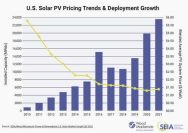
Inflation Reduction Act Actually Causing Inflation
“Greenflation” will be the word of the year by late 2023.
In 2022, the US Congress passed the biggest climate bill in history — under the name the “Inflation Reduction Act.” It calls for a 10-year torrent of money to be spent on installing heat pumps, solar panels and other clean energy equipment in American households and businesses.
Starting today, the Act will offer households thousands of dollars to transition over from fossil-fuel burning heaters, stoves and cars to cleaner versions. Middle-class families will be able to access tax credits for solar, electric stoves, cars, and other kinds of renewable energy equipment. By mid-2023, lower-income households will get discounts without having to wait to file their taxes to get the cash back. This online tool shows what you might be eligible for, depending on your Zip code and income.
According to Washington Post journalist Shannon Osaka the new US Inflation Reduction Act provides multiple ways to green the economy and save money. But the money saved per household will be depend on future energy prices, and the effect on carbon emissions will be relatively slight, unless the growth in clean energy is accompanied by a sharp overall reduction in energy consumption.
Up to a billion separate items of home and office equipment will need to be swapped out – from fridges and heaters to aircon units and cars. Who will manufacture all these wonderful new products? And who will install and maintain them? There is already a shortage of both labor and materials.
Economists say the IRA may not reduce inflation very much, but they don’t say it could spur inflation in the sectors affected by the new law. As millions of households across America switch to cleaner energy sources with the help of government money (meaning our money), there will be shortages of both skilled labor and of equipment, driving up prices.
The growth rate of all occupations in the U.S. is predicted to be 3.7% from 2019 to 2029. Wind turbine service technicians and solar photovoltaic installers, on the other hand, are predicted to grow at a rate of 60.7% and 50.5%, respectively, , from a very low base.
If this prediction is correct, together, these two occupations will add only 10,400 new jobs to the U.S. economy by 2029.
| Quick Facts: Solar Photovoltaic Installers | |
|---|---|
| 2021 Median Pay | $47,670 per year $22.92 per hour |
| Typical Entry-Level Education | High school diploma or equivalent |
| Work Experience in a Related Occupation | None |
| On-the-job Training | Moderate-term on-the-job training |
| Number of Jobs, 2021 | 17,100 |
| Job Outlook, 2021-31 | 27% (Much faster than average) |